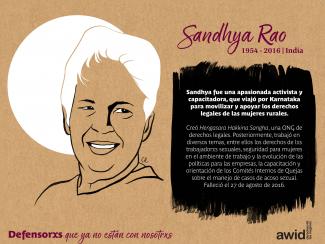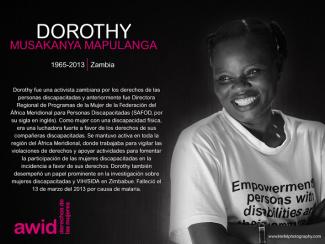
Dorothy Musakanya Mapulanga

The Human Rights Council (HRC) is the key intergovernmental body within the United Nations system responsible for the promotion and protection of all human rights around the globe. It holds three regular sessions a year: in March, June and September. The Office of the UN High Commissioner for Human Rights (OHCHR) is the secretariat for the HRC.
Debating and passing resolutions on global human rights issues and human rights situations in particular countries
Examining complaints from victims of human rights violations or activist organizations on behalf of victims of human rights violations
Appointing independent experts (known as “Special Procedures”) to review human rights violations in specific countries and examine and further global human rights issues
Engaging in discussions with experts and governments on human rights issues
Assessing the human rights records of all UN Member States every four and a half years through the Universal Periodic Review
AWID works with feminist, progressive and human rights partners to share key knowledge, convene civil society dialogues and events, and influence negotiations and outcomes of the session.
Por María Bonita - Venezuela
Las ancestras hacen un círculo
Sagrado, vivo, poderoso
Estamos en el medio
Sintiendo su fuerza.
Suena el tambor de la tierra
Nuestra piel se viste de colores
Somos verdes, rojas, naranja, azules, violetas, negras
Suena el tambor de la tierra
La voz vibra, el grito ocupa, el canto se presenta, arrulla el sueño, despierta conciencia.
Suena el tambor de la tierra
Y la mirada se hace cómplice, amiga, profunda.
Suena el tambor de la tierra
El corazón es uno solo, percuta el alma, nos invita a movernos, nos vuelve deseo, nos indica un camino.
El de la juntanza comunera, el del poder popular, el del autogobierno, el de la revolución de las mujeres, el del cuidado subversivo.
Suena el tambor de la tierra
Y yo les invito a entrar, a ser voz, piel, mirada, semilla, fuego, canción, comunión.
Suena el tambor de la tierra
Y yo les invito a descubrirla, a amarla, a conocerla, a defenderla, desde el corazón de la comuna
Hace 25 años que habitan las mismas calles polvorientas, en lo más alto de una loma con nombre de león, vienen de diferentes lugares, muchas con tradición campesina, tienen la piel color rebeldía, color cardón, porque en ellas habita el semiárido larense, de allí su amor por la vida, su aprecio, el cuidado y resguardo por el agua y el territorio, es que son herederas de la estirpe Gayón, Ayaman, comunidades indígenas que habitaron y habitan el norte del estado Lara.
Desde muy jóvenes aprendieron que la maternidad es un signo del que no se escapa con facilidad, cuidar a los hijos, la casa, el marido, lavar, planchar, cocinar, fregar, todo tenía que estar impecable, insisten.
Y la vida era eso, eso y la violencia, el insulto, el maltrato, el golpe, el reclamo, la queja era algo de esperar, algo que parecía natural, así se vivían los días, la cotidianidad, en aquellas calles de tierra viviendo en pequeñas casitas de chapa, de zinc, sin servicios básicos, esa era pobreza, la precariedad cuando llego un hombre, si, un hombre, un proyecto, una revolución inusual porque se hizo sin la guerra.
Entonces las invitaron a salir, las invitaron a tomar la calle, el espacio público y ellas en ese proceso derribaron puertas y ventanas, rompieron cadenas, se soltaron el cabello, se sintieron libres, libres cimarronas, rebeldes caribes, guerreras libertadoras.
Y es que eso de independencia y soberanía es algo que las que pudieron estudiar lo habían leído, pero sentirse, sentirse protagonistas de un proceso de cambio de transformación social, eso es una importante conquista que tenemos que mencionar, que no podemos olvidar.
En lo alto de esa loma se siente la complicidad, el fuego compartido, los años de lucha, cuentan que una de ellas se iba con su paragua por las tardes y de casa en casa tomando un cafecito, conversando con la gente iba convocando, convenciendo
¡Vamos a hacer el consejo comunal!
¡Avancemos hacia la comuna!
Hagamos planes de trabajo para la educación, el deporte, la salud, la alimentación, el comité de mujer e igualdad de género, la economía.
¡Vamos a ser Gobierno Popular para que el Barrio se Ponga Bonito!
Y así llegaron las casas, el consultorio popular, el simoncito, el proyecto de electrificación, el de agua potable son algunos de los logros comunales, de los sueños comunales hechos realidad.
Y ustedes se preguntaran como llego una cuentera, una cuenta cuentos a esa loma con nombre de león
Y yo les digo: es que nací bochinchera, dando pelea, nací callejera diría mi abuela, disposicioner agregaría el Comandante Chávez, de tanto andar, renegar, pelear y dudar de aquel militar, me termino convenciendo con el proyecto comunal, con eso de ser autogobierno, de que el pueblo administre sus recursos, con eso de todo el poder para las comunas, con eso me convenció.
Pero yo sabía que algo faltaba porque las mujeres, las mujeres comuneras seguimos construyendo poder popular y nuestro corazón se viste de lucha antiimperialista y anticapitalista pero hay algo que nos duele, que nos sigue afectando, hay heridas del patriarcado que están presente.
Entonces un día, me descubro llorando y sonó el tambor de la tierra y las ancestras hablaron.
Me vi rodeada de un grupo de mujeres que me sostuvo, me contuvo mientras me derramaba frente a ellas, mientras dolía y me liberaba al mismo tiempo, así que descubrí que el amor entre mujeres te sana, te salva, que nuestra amistad en profundamente política y que la sororidad es una manera de andar, de vivir la vida, a partir de ese momento no me volví a sentir sola, no me sentí más nunca una isla, porque sé que hay un grupo de mujeres que me llevan, me traen, me aman, me cuidan y viceversa, sé que esta forma de hacerme feminista con la mística de mujeres por la vida es una experiencia de sentirse conectada, amada por mujeres aunque no las vuelvas a ver, entonces como no querer que esto que me ocurrió, le pase a otras, este amanecer, este parirme un nuevo corazón es un regalo de las diosas que tiene que ser compartido.
Por eso decidí unirme a ellas y echar a andar por las comunas, comencé a caminar, a conocer otras experiencias, comenzamos a debatir sobre salud, educación, alimentación, nos fuimos predicando el verbo antipatriacal y las comunas libres de machismo, insistimos en recuperar la sabiduría ancestral, la intuición, decidimos defender la vida hablando de aborto y nos vemos riendo, llorando, debatiendo, reflexionando, me encuentro con macu, con la china, yenni, carolina, maria, ramona, irma y hasta con nuestra hermana yenifer que se nos fue hace poco.
Este es mi homenaje a ellas, a las mujeres loma a las mujeres leonas, ellas sin duda se sembraron en mí con tanta fuerza que son parte de mis latidos.
Ellas sin duda marca un camino, ellas son las que hacen posible el cuidado familiar, el cuidado colectivo, ellas son también una fuerza, una fuerza en el territorio para superar el bloqueo, la violencia patriarcal, la traición política, para superar la burocracia la corrupción.
Ellas sin duda marcan un camino
Ellas sin duda son una brújula
Ellas sin duda son el corazón de la comuna
Gracias.
Por favor, calcula los costos de viaje a Bangkok, alojamiento y viáticos, visado, cualquier necesidad de accesibilidad y gastos incidentales, además de la tarifa de inscripción que se anunciará próximamente. Los hoteles en la zona de Sukhumvit en Bangkok tienen un rango de precios de USD$50 a $200 por noche en ocupación doble.
Lxs afiliadxs de AWID reciben un descuento al registrarse, por lo tanto, si aún no te has sumado a la membresía, te invitamos a considerar unirte y formar parte de nuestra comunidad feminista global.

Anti-rights actors adopt a double strategy. As well as launching outright attacks on the multilateral system, anti-rights actors also undermine human rights from within. Anti-rights actors engage with the aim of co-opting processes, entrenching regressive norms, and undermining accountability.
เราจะติดต่อกับองค์กรพาร์เนอร์ในอดีตเพื่อให้มั่นใจว่าความพยายามที่เคยเตรียมไว้ในอดีตมีความหมาย หากองค์กรของคุณมีการเปลี่ยนแปลงข้อมูลติดต่อจากฟอรัมครั้งก่อนหน้ากรุณาแจ้งให้พวกเราทราบเพื่อให้เราสามารถติดต่อถึงคุณได้

par Marianne Mesfin Asfaw
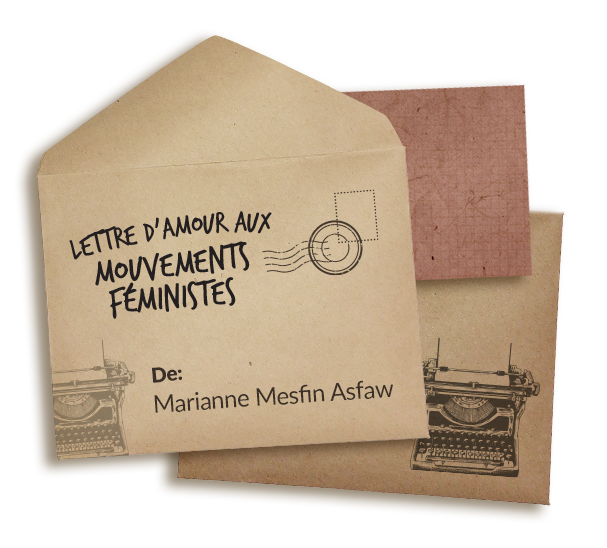
J’ai de nombreux souvenirs émotifs de mon aventure vers le féminisme, mais un en particulier me vient à l’esprit. Je suis alors en études supérieures, à une conférence dans le cadre d’un cours sur la théorie féministe. La conférence porte sur le féminisme africain et la professeure nous parle de l’histoire du panafricanisme et explique en quoi ce mouvement est patriarcal, centré sur les hommes, et comment les universitaires panafricanistes perpétuent l’effacement des femmes africaines. Elle commente la manière dont les contributions des Africaines aux luttes anticoloniales et décoloniales sur le continent ne sont que rarement, voire jamais l’objet de discussions et que l’on ne crédite que rarement les autrices. Nous lisons alors des textes sur des universitaires africaines féministes qui remettent en question cet effacement et mettent en lumière les récits de mouvements et efforts de résistance menés par des Africaines. Cela semble naïf, mais ce qui me paraissait le plus frappant était que l’on puisse juxtaposer les termes « africaine » et « féministe ». Et également que nous étions très nombreuses dans les différents coins du continent à nous débattre avec une histoire, des politiques et des normes sociétales compliquées, que nous envisagions cependant toutes selon le prisme du féminisme. Je suis sortie de cette conférence à la fois émue et complètement chamboulée. Trois de mes amies (toutes féministes africaines) et moi-même sommes sorties discuter du contenu de ce que nous venions d’entendre. Nous étions ébahies par l’excellence de la conférence et du contenu mais, plus que tout encore, nous nous sentions véritablement vues. Et c’est cette sensation qui m’est restée.
Tomber en amour avec le féminisme était époustouflant. C’était comme de finalement pouvoir parler à un coup de cœur de longue date, et de se rendre compte qu’on lui plaît aussi. Je parle de coup de cœur parce qu’au lycée je me disais féministe, tout en sentant que je n’en savais pas assez. Y avait-il une bonne manière d’être féministe? Et si je ne m’y prenais pas bien? Ma première conférence en Études féministes a répondu à toutes ces questions. C’était génial d’apprendre toutes ces histoires de résistance féministe et de démantèlement du patriarcat. Je sentais que je m’affirmais et que j’étais validée, mais je sentais également qu’il manquait quelque chose.
Approfondir ma relation avec le féminisme dans une institution universitaire où la majorité des élèves et du corps enseignant étaient blancs signifiait que pendant ces premières années, nous ne discutions que rarement de la place de la race ou du dénigrement des Noir·es dans les mouvements féministes traditionnels. Dans la plupart des cours, il y avait peut-être une semaine, ou pire une seule séance qui portait sur la race et nous lisions alors généralement un texte de bell hooks ou de Kimberly Crenshaw sur l’intersectionnalité, et peut-être un autre de Patricia Hill Collins. Et la semaine suivante, nous continuions à botter le sujet en touche. Je gérais cette situation en incluant la race et le féminisme noir dans presque tous mes travaux, en écrivant sur les cheveux des Noir·es et la politique de respectabilité, sur l’hypersexualisation du corps des femmes noires, et bien plus encore. Avec le temps, j’ai pris conscience que je tentais de combler une lacune, sans toutefois saisir laquelle.
Découvrir le féminisme africain et en apprendre davantage me permettait de boucler la boucle. Je comprenais que j’avais encore tant de choses à apprendre. Et principalement, que mon africanité et mon féminisme politique n’avaient pas à être écartés. Ils avaient en réalité tant à apprendre l’un de l’autre, et des féministes africaines faisaient déjà ce travail. C’était la pièce manquante et insaisissable lors de mon exploration du féminisme pendant mes années universitaires.
Pour moi, le féminisme est l’antithèse de l’apathie sociale et politique. Il signifie également que dès lors que l’on adopte une optique féministe, plus rien ne peut être pareil. Mes amies et moi parlions de ce que ça fait de mettre des lunettes qu’on ne peut plus jamais enlever, parce que l’on voit le monde pour ce qu’il est, avec tout son désordre. Un désordre qu’on ne peut pas simplement ignorer ou laisser tomber. J’ai donc fait la promesse aux mouvements féministes de ne jamais arrêter d’apprendre, de continuer à étirer les limites de mon empathie et de ne jamais vivre passivement. De dédier davantage de temps et d’espace dans ma vie aux mouvements féministes et de continuer à amplifier, célébrer, documenter et citer les travaux de féministes africaines. Je m’engage également à placer l’attention et le soin au centre de tout et à donner la priorité au plaisir dans cette aventure féministe, parce que nos mouvements en ont besoin pour durer.
Nous avons parfaitement conscience des obstacles pratiques et de la détresse émotionnelle générés par les voyages internationaux, en particulier pour les personnes originaires des pays du Sud mondial. L'AWID collabore avec le TCEB (Thailand Convention and Exhibition Bureau) afin d'aider les participant·e·s au Forum à obtenir un visa. De plus amples informations concernant l'aide à l'obtention de visas seront disponibles au moment de l'inscription, y compris les coordonnées indiquant où et comment déposer votre demande.
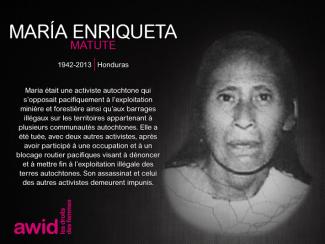
En esta historieta de la ilustradora Sophia, se puede seguir a nuestra superheroína feminista que recupera las narrativas capturadas por lxs actores anti-derechos en distintos lugares y salva al mundo.
ถ้ากลุ่มหรือองค์กรของคุณได้รับการสนับสนุนเงินทุน คุณสามารถพูดคุยกับแหล่งทุนของคุณได้ตั้งแต่ตอนนี้หากพวกเค้าสามารถสนับสนุนการเดินทางและการเข้าร่วมของคุณได้ หลายองค์กรวางแผนงบประมาณปีหน้าในปี 2566 จึงเป็นการดีกว่าหากสามารถพูดคุยกับพวกเค้าก่อนภายในปีนี้
Related content
African Women's Development Fund: Remembering a Warrior: Prudence Mabele
BBC: Prudence Mabele: The life of the South African HIV campaigner
Mail and Guardian: The Pied Piper of the broken-hearted: HIV activist Prudence Mabele
Face2Face Africa: Prudence Mabele, 1st Black SA Woman To Reveal HIV Positive Status Dies At 46
Ms. Prudence Mabele - I'm committed to respond to HIV! (Video)
AWLN Interview with Prudence Mabele of South Africa (Video)
Sangoma: Why I take ARVs (Video)
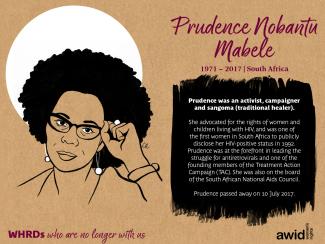

How does a movement start?
we get expelled by ghosts from a house, a family, and a nation
we arrive fatigued to a space (sometimes an actual address) but mainly to a state of being
preceded by a fallen star
perhaps our arrival isn’t accompanied by fatigue,
maybe accompanied by fear
perhaps our arrival isn’t accompanied by fear
maybe accompanied by anger
from issues that keep on repeating themselves:
a stab in the heart (read heartache)
a bullet in the back (read betrayal)
forced disappearances
bodies sentenced by marriage, disfiguration, and chronic fatigue
yet when we arrive, we gather, whisper, speak and weep.
This is how our movements begin when we arrive at each other
We become seeds,
This is how our movements start when we plant each other
Becoming flowers, sometimes just thorns, sometimes fruits,
we are each other’s oasis
to sing for the battles
to make remedies
to place the faces of our lovers, the shape of their smiles, the sound of their laughter
the secret of turning silences into language
the detailed instructions of witches
our movement is: for all of us
when we arrive as seeds with the purpose of flowering.
Sara AbuGhazal
www.badiya.blog
AWID’s working languages are English, French and Spanish. Thai will be added as the local language, as well as sign language & other accessibility measures. Other languages may be added if funding permits, so check back regularly for updates. We care about language justice and will try to include as many languages as we can and as our resources allow. We hope to create multiple opportunities for many of us to be present in our languages and to communicate with each other.
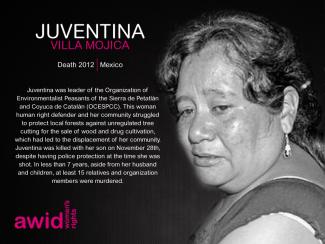
Lorsque notre travail incarné devient un profit entre les mains de systèmes que nous cherchons à démanteler, il n’est pas étonnant que nos sexualités et nos plaisirs soient une fois de plus relégués à la marge – surtout lorsqu’ils ne sont pas assez rentables. À plusieurs reprises au cours de la production de ce numéro, nous nous sommes demandé ce qui se passerait si nous refusions de nous plier aux services essentiels du capitalisme. Mais pouvons-nous oser poser cette question, lorsque nous sommes épuisé·e·s par le monde? Peut-être que nos sexualités sont si facilement rejetées parce qu’elles ne sont pas considérées comme des formes de soins. Peut-être que ce dont nous avons besoin, c’est de réimaginer le plaisir comme une forme de soin radical – un soin qui est également anticapitaliste et anti-institutionnel.
เป็นกระบวนการเดียวกันและกำหนดเวลาเดียวกันทุกประการ โปรดใช้แบบฟอร์มเดียวกันนี้ในการส่งกิจกรรมของคุณ ไม่ว่าจะเป็นกิจกรรมที่จัดแบบพบกันทางกายภาพ ทางออนไลน์ หรือทั้งสองแบบ (ไฮบริด)
